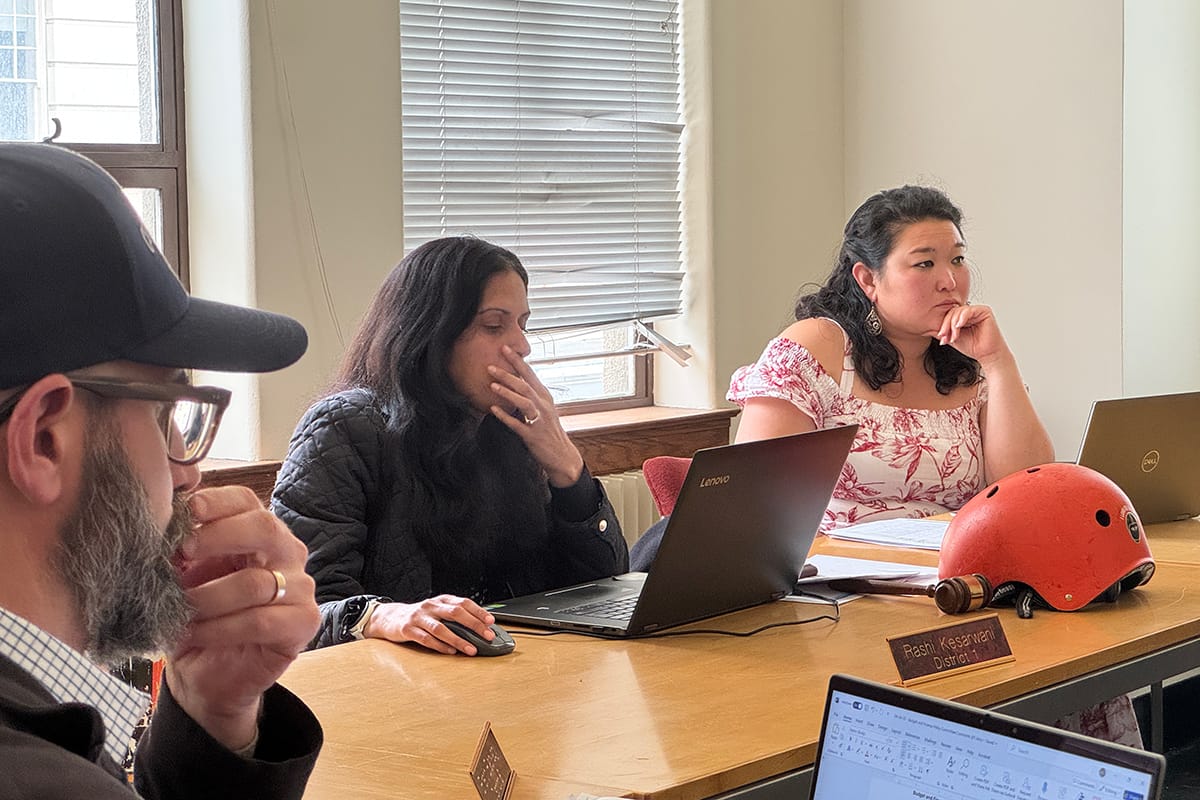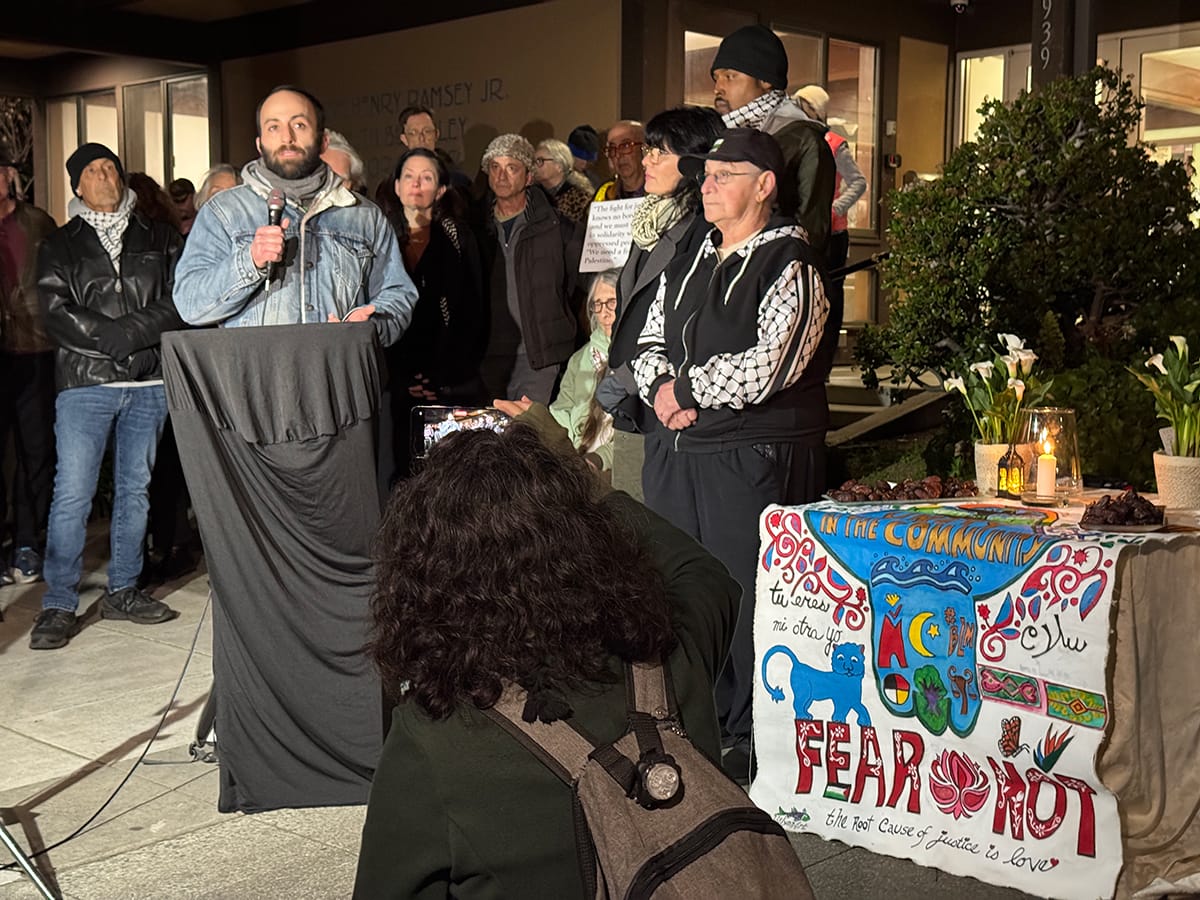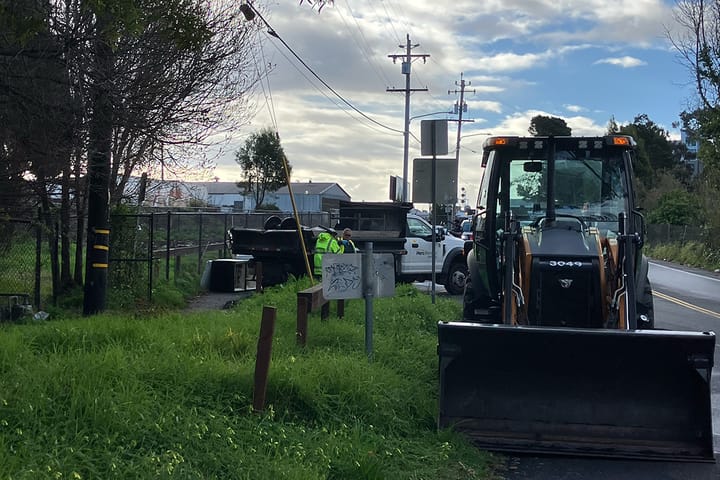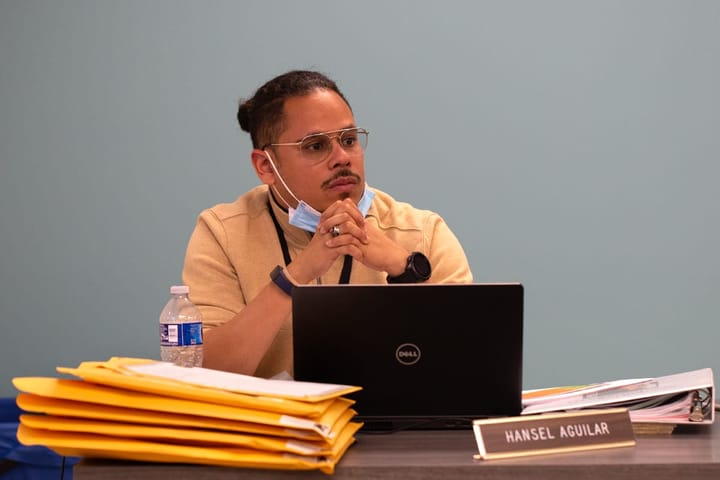Berkeley ceasefire vote splits City Council and community
Mayor Adena Ishii was unable to unite her colleagues behind a single proposal. A Berkeley-focused item from Terry Taplin won the night.
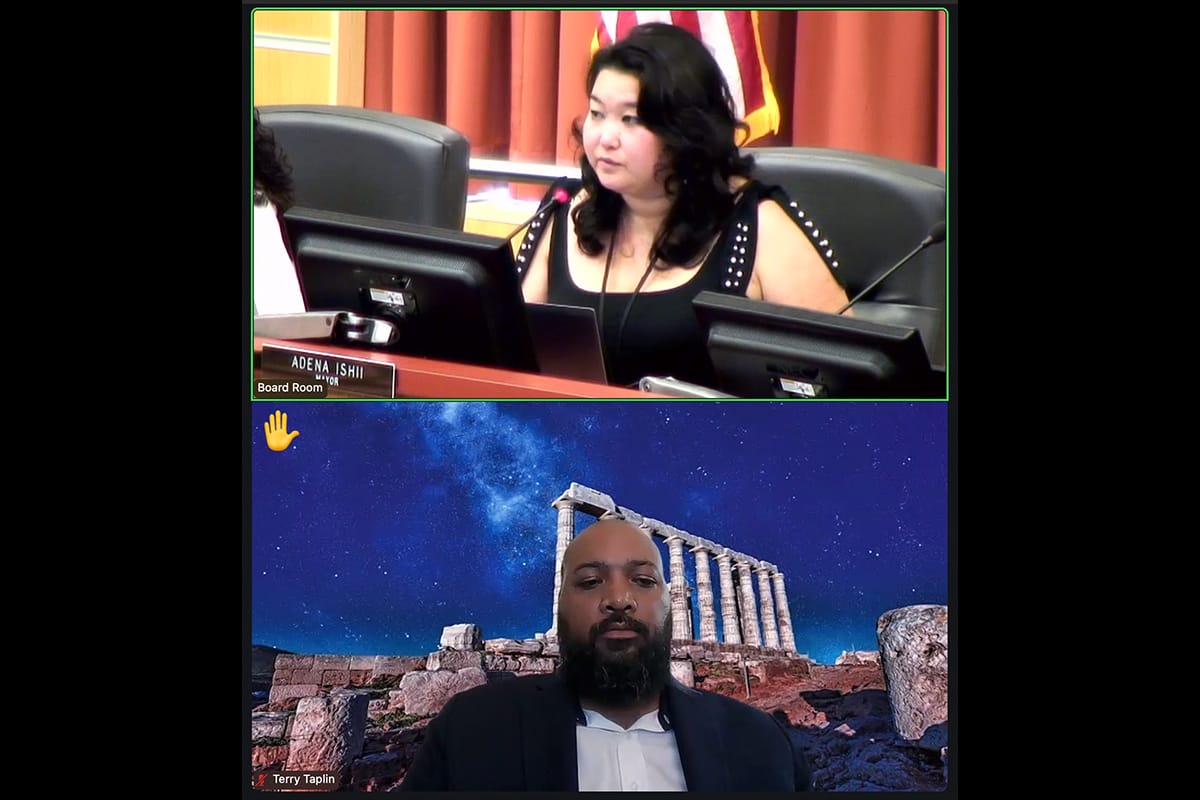
A Berkeley City Council meeting ended in chaos Monday night, as an unruly crowd chanted "no justice, no peace" and a protester declared ominously that "future generations will remember this day."
The special meeting — focused on dueling ceasefire resolutions related to the Israel-Gaza War — may have taken the prize for the longest public comment period, lasting more than 5 hours, followed by the pithiest council discussion: Officials spoke for less than 30 minutes before taking action.
The "discussion" saw next to no debate, as council members mostly read from prepared remarks in a nod to the inflammatory nature of the subject, not to mention the ticking clock.
In a break with precedent, Mayor Adena Ishii made no overarching remarks before the late-night vote, either to put the emotional meeting in context or to lobby for her own resolution, which she put forward with Councilman Ben Bartlett.
Bartlett, for his part, elected not to speak at all.
In the end, a Berkeley-focused resolution from Councilman Terry Taplin won the night with a supermajority decision.
Councilwoman Cecilia Lunaparra cast the lone no vote while Bartlett abstained.
A breach of council protocol
The near-unanimous decision belied the turmoil that preceded it.
For a few moments, it seemed the vote might not happen at all — when Mayor Ishii tried to end the meeting, in a breach of council protocol, before casting her vote.
City Clerk Mark Numainville was still recording votes when Ishii made her motion to adjourn. But, as per longstanding council rules, the roll call must conclude before a new motion is made.
When Ishii moved to adjourn, hers was the only vote left to cast.
After the meeting, some wondered whether the mayor intentionally tried to disrupt the vote by adjourning prematurely. (Ishii did not respond Tuesday to requests for comment from The Scanner.)
Others said the mayor may not have known the rules, or was flummoxed by the moment — with the crowd standing up and chanting loudly in opposition after seeing the direction of the vote.
It's also possible that Ishii was just trying to keep her word: On Monday night, she repeatedly warned the roomful of activists that she would adjourn with no action if they refused to be respectful.
She also reminded attendees that she had called the meeting at their behest, and urged them to behave.
" I have already promised that we are not gonna have this meeting in the back room," she said shortly after 11 p.m. as council members began making their remarks. "If you keep interrupting, there will be a motion to adjourn."
Under the prior regime, the City Council retreated to the back room more than once due to safety concerns when faced with a rowdy crowd stirred up about the war.
Berkeley ceasefire vote a long time coming
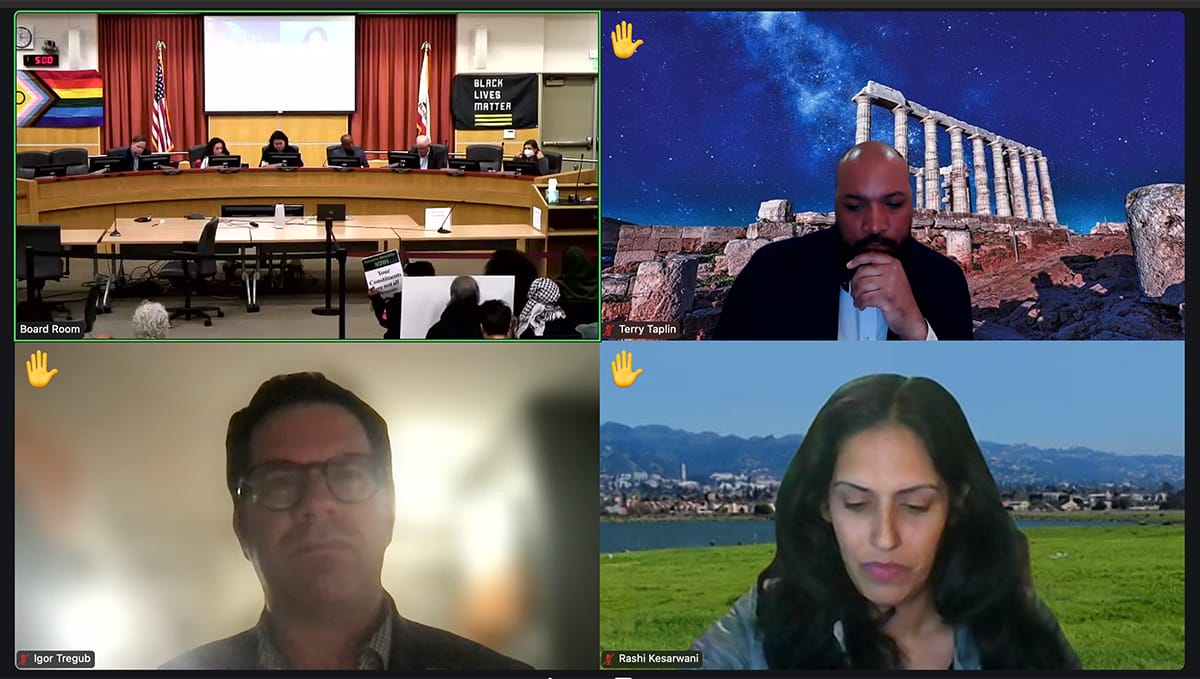
In all likelihood, Monday's meeting never would have happened had it not been for Ishii, who pledged early on to organize it in response to demands from the activist community, local residents with direct ties to Gaza and others who have become passionate about the cause.
Protesters had made similar demands of former Berkeley Mayor Jesse Arreguín, who kept the issue off the agenda even as a long line of other Bay Area cities approved their own ceasefire resolutions.
Despite Ishii's efforts, multiple speakers pilloried her Monday night after she broke down on the dais while reading her resolution into the record.
Several went so far as to rebuke her for her "crocodile tears" and "watered-down" language, which failed to demand an arms embargo against the state of Israel.
Going into the meeting, the Berkeley City Council had three items to consider: the so-called arms embargo resolution, which narrowly made it out of the city's Peace and Justice Commission (PJC) in an 8-7 vote last year; the mayor's compromise resolution, which tried but failed to forge a middle way; and Taplin's alternative proposal, which struck most of the PJC language and focused instead "on the war’s impact on the Berkeley community" while "affirming the city’s aspirations for a lasting peace abroad."
Violence erupts amid Berkeley ceasefire debates
Even before the meeting started, tensions were high.
The mood only soured when dozens of people who arrived early found the meeting room at capacity and had to wait hours outside a metal gate to get inside to comment.
Speakers on both sides of the issue said the mayor should have found a larger room for the event to allow the democratic process to unfold.
Both sides also seemed to agree in their frustration over the mayor's efforts to manage public comment — initially by setting a 3-hour time limit (a largely unprecedented move for a Berkeley meeting), then revising her position later in the night: extending the comment period and, according to some, applying her moderation rules inconsistently.
Community members who were stuck outside said the city had no system in place to manage the crowd or allow people to enter the room in a fair way as space became available.
As a result, one member of the group — a former Peace and Justice Commission member — took it upon herself to control the door.
A physical altercation broke out when the former commissioner refused to let a pro-Israel speaker come into the room to speak, one witness told The Scanner.
The witness said the former commissioner grabbed the arm of the pro-Israel speaker, an older woman, to move her out of the way, at which point a man — also part of the pro-Israel camp — stood in between them to act as a shield.
At that point, the witness said, a man in a keffiyeh grabbed the other man from behind, pulled him backward, put him in a chokehold and began to hit him.
Nearby Berkeley police who had been monitoring the crowd then moved in to restore order, the witness said.
Inside the meeting room, people on both sides of the debate referenced the violence outside and blamed the other group for instigating it, in what one person called a "microcosm of what's playing out in the Middle East."
Mayor: "You can snap — but, please, no booing"
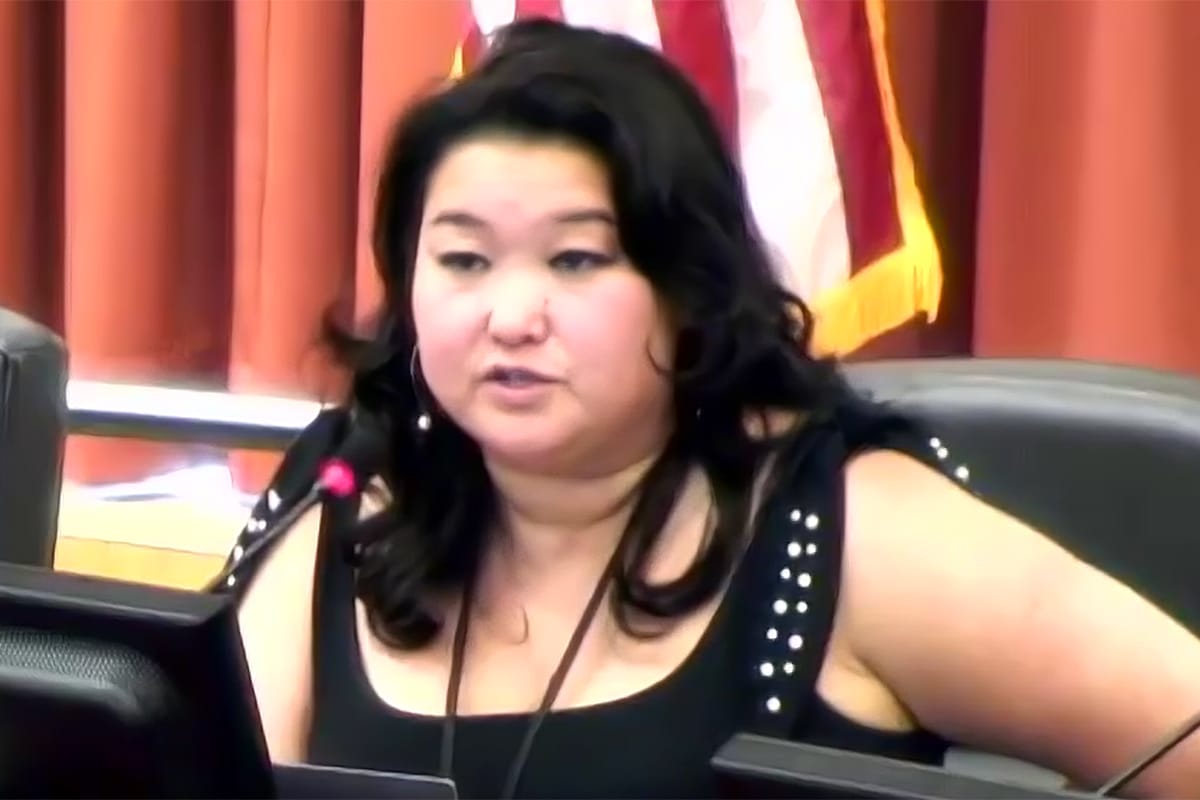
Given the contentious topic and the months-long buildup to Monday's meeting, it was never going to be an easy night.
Early on, Mayor Ishii attempted to set a civil tone by inviting attendees to join her in taking three deep breaths before beginning public comment.
Some participated, while others jeered at officials on the dais, their taunts audible throughout the room.
(The Scanner watched the meeting remotely over Zoom as it happened.)
When it was Councilman Taplin's turn to read his resolution into the record, the heckling continued.
Ishii attempted to keep order, cautioning the crowd: "You can clap, you can snap — but, please, no booing."
As the hours wore on, she repeatedly urged civility to varying levels of success.
Most of the disruptions appeared to come from the activist side, including some who made it clear they believed breaking the decorum rules about an issue of such import was a matter of civic duty.
As a result, most of the speakers in the pro-Israel camp were repeatedly badgered, and struggled to get through their remarks without interruption.
The pro-Israel speakers were consistent in their comments, calling on the Berkeley City Council to focus on local issues rather than divisive matters of foreign policy and asking them to support the Taplin resolution.
They said many of the stories being shared were part of a sophisticated propaganda machine being driven by Hamas to foment antisemitism and undermine the state of Israel.
Meanwhile, the speakers supporting Gaza, who made up the vast majority in the room, said Berkeley officials had a duty to call for an arms embargo with Israel and take a stand against a genocide being livestreamed for the world to see.
Some described heartbreaking losses in Gaza suffered by their own families or witnessed firsthand, and said Berkeley must take a stand publicly, particularly given its many prior foreign policy items, including a ceasefire resolution in 2022 in support of Ukraine.
Lunaparra: "We will not be passive in the face of violence"
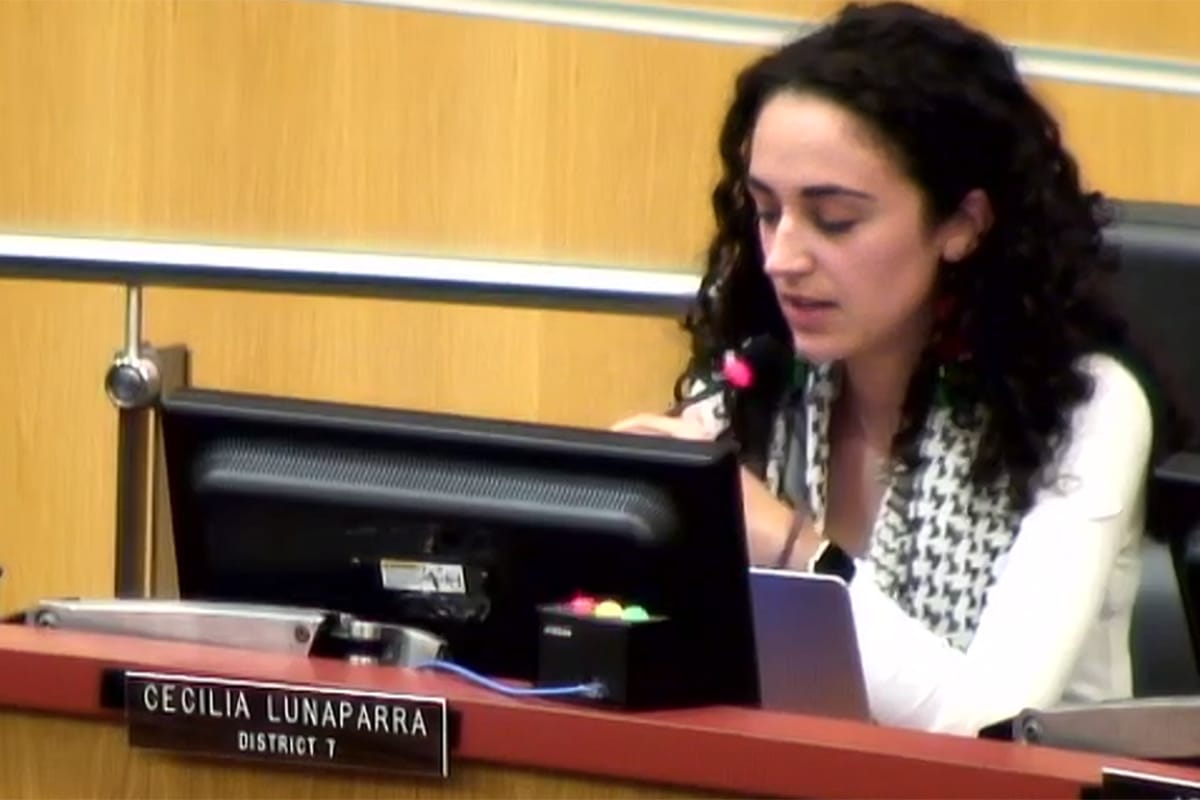
Throughout the night, the public majority made it clear that the Peace and Justice ceasefire resolution, with its arms embargo, was the only item worthy of support.
But, as council members began their comments, it was clear that was never going to happen.
In response, some of the attendees called officials a variety of names, from outright liars to "cowards in the face of genocide," shouting out in anger and frustration as the mayor repeatedly asked for order.
The only official to win kudos from the crowd was Councilwoman Cecilia Lunaparra, who aligned herself with the Peace and Justice Commission resolution and called for an arms embargo.
Lunaparra said U.S. tax dollars had been "actively facilitating this genocide in Gaza" and that the City Council's failure to act sooner had " fanned the flames of hatred and resentment within our own community."
" Tonight, we have the opportunity to demonstrate that we will not be passive in the face of violence, oppression, genocide, ethnic cleansing and apartheid," she said. "Let us show our community that we are listening, that we are committed to justice and that we will not let their voices go unheard."
Speaking at some length, including about what she said was growing public support for an arms embargo, Lunaparra called on her colleagues to act.
" Many have called out for us to speak out or use our position to amplify their voices, to defend the lives of families and communities who are being massacred. And yet our silence continues to echo," she said. "They feel abandoned, as though their lives and their pain do not matter to this council. They feel betrayed by a system that is meant to protect them."
The crowd met her remarks with nearly 30 seconds of applause and hearty cheers of appreciation.
Humbert: Arms embargo resolution "a non-starter"
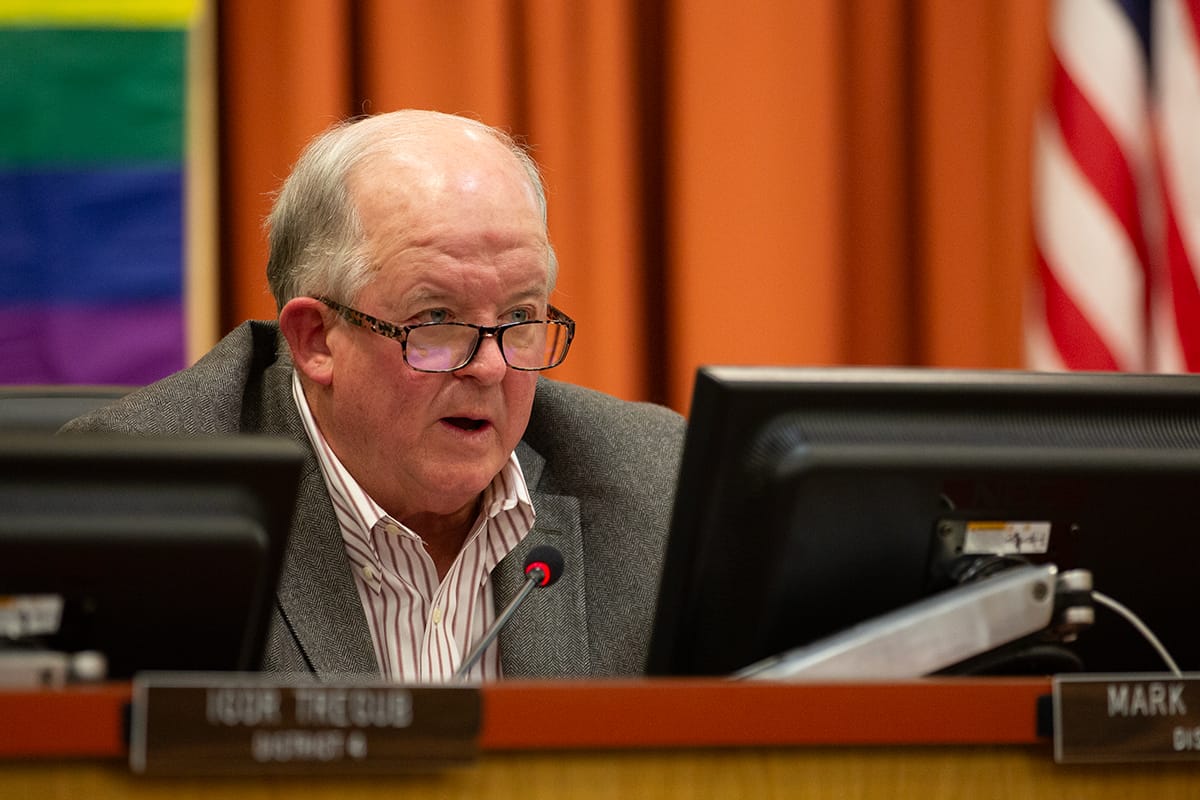
For the rest of the Berkeley City Council, the matter appeared to come down to a contest between the mayor's compromise version and Taplin's alternative resolution.
As officials made their remarks, gadflies began an informal tally of their positions.
Councilman Mark Humbert was the first to throw his support behind the Taplin item.
He called the Peace and Justice resolution "a non-starter" that failed to "condemn Hamas, a terrorist organization dedicated to the complete destruction of Israel."
As members of the crowd shouted at him, including a woman who called his comments "bullshit," Humbert said he would not be bullied by "angry demands and threats."
He said he could not support the mayor's motion, either, in part because it called the Hamas-led Oct. 7 attacks on Israel a "military escalation" and, as a result, had "sown further mistrust and division within our community."
Oct. 7, Humbert said, "was a violent terrorist attack on civilians during which Hamas terrorists perpetrated outrageous acts of mass murder, torture, sexual violence, and kidnapping of civilians, including babies."
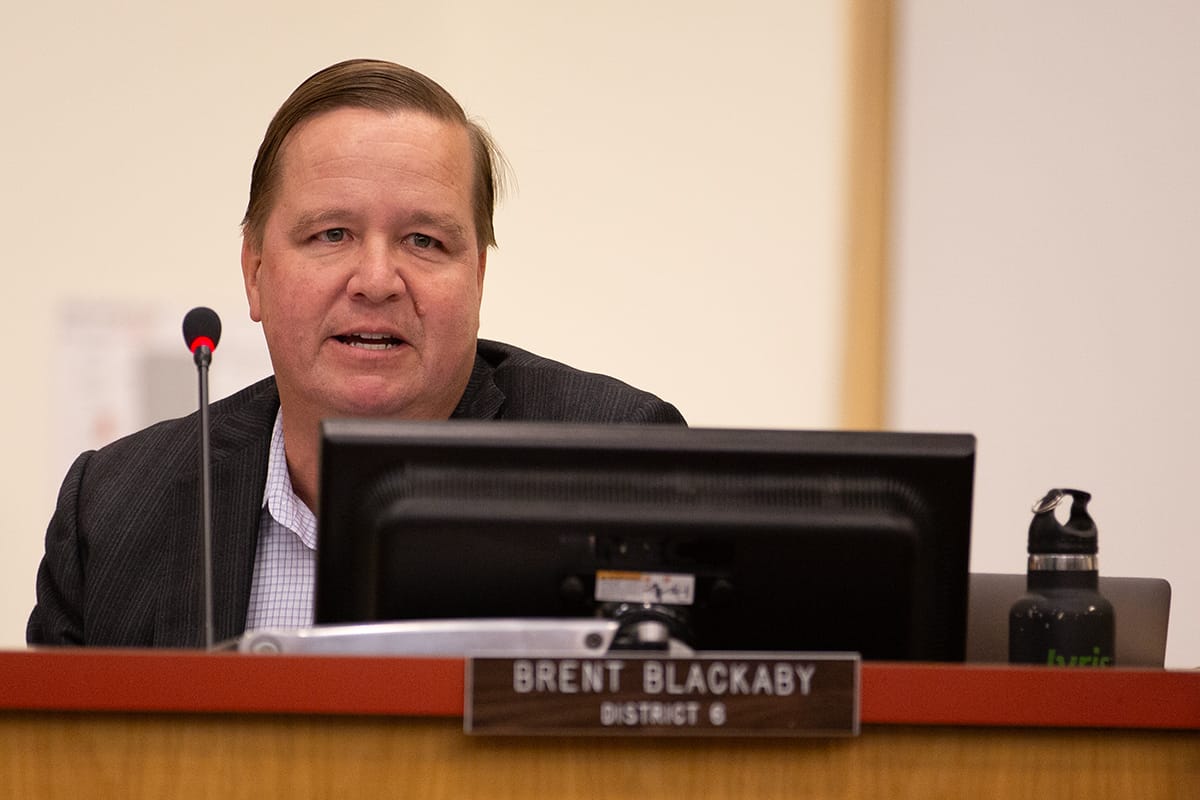
Councilman Brent Blackaby spoke next, thanking community members, including the Peace and Justice Commission, for their testimony and their work.
Members of the crowd repeatedly interrupted him, too.
Blackaby said he supported the Taplin motion because, "most importantly, to me, it centers almost all of its language on what the priority of the City Council must be: the people of Berkeley, our community and our values."
He continued: "I feel like that's the most important statement I can make right here tonight, because I'm ill-equipped to opine on foreign policy from this seat and, even if I were, could have no impact on it."
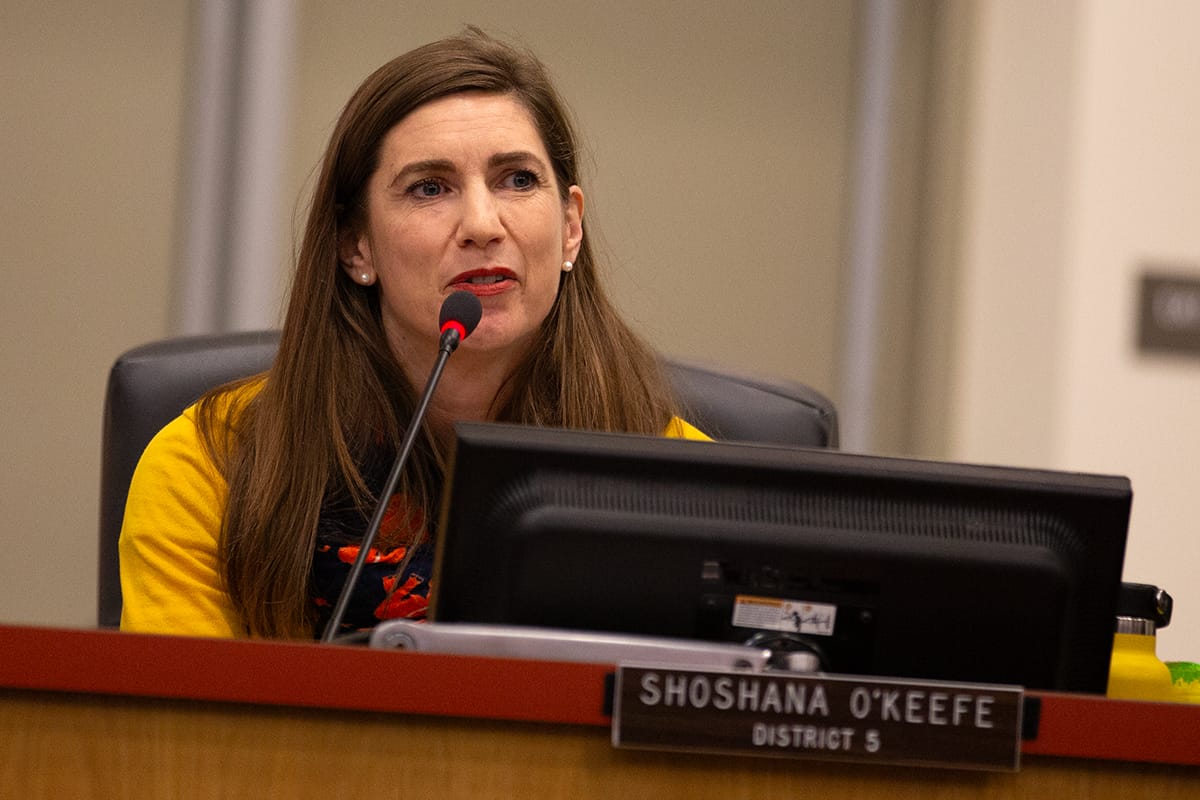
Councilwoman Shoshana O’Keefe said she could only support the Taplin motion, largely due to an abiding belief, dating back to her days as a Berkeley High School student, that city leaders should not spend time deliberating international affairs.
"Honestly, it confused and bothered me even then. It's just how I organized my understanding of the world," she said. "I've always been deeply rooted in practicality. And, to me, doing this made no sense."
Taplin: International resolutions "a wasteful distraction"
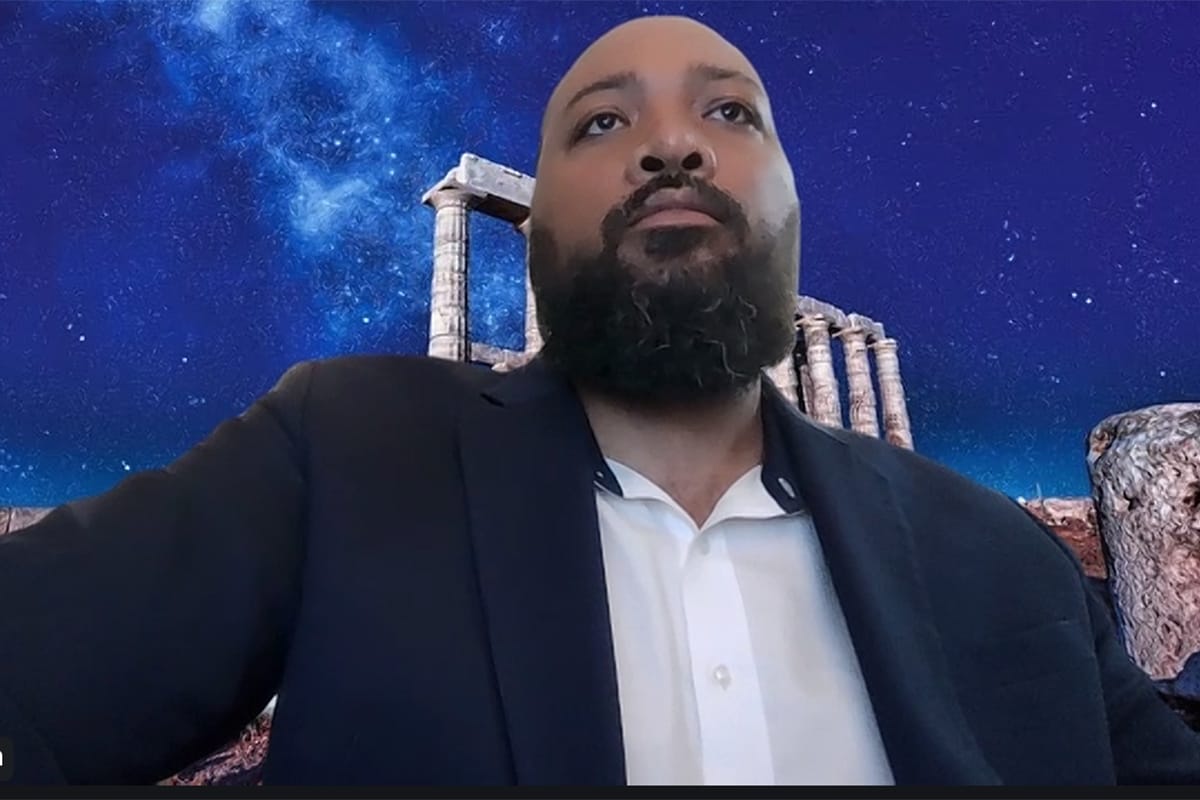
Taplin went next, thanking "members of the Jewish community" and others in the minority who spoke out Monday night "despite harassment, intimidation, shaming, heckling and every attempt to make our public spaces hostile and unwelcoming to expressions of different viewpoints."
(Taplin attended the meeting remotely Monday due to caretaking duties. Council members Igor Tregub and Rashi Kesarwani also attended remotely, as previously noticed on the agenda.)
Taplin called international resolutions from Berkeley officials "solipsistic at best" and said they were, at worst, "a wasteful distraction from the local issues that we are actually obligated and authorized to address — while having zero impact on foreign affairs and serving no other purpose than to expose our community to toxicity, abuse and the reignition of trauma."
"Several hours of conspiratorial anti-Jewish vitriol have failed to convince me otherwise," he said.
Some of the most divisive commentary of the night came from a longtime Berkeley activist who wore a shirt to honor Yahya Sinwar, the mastermind of the Oct. 7 attacks that killed approximately 1,200 people in Israel and saw more than 250 others taken hostage.
The activist lauded Sinwar as a family man and brilliant strategist. In response to his comments, some members of the crowd chanted, "Long live Sinwar."
" No one is going to threaten or force me into regurgitating language on command in pursuit of a political agenda that has nothing to do with local governance," Taplin told his colleagues.
Two officials on the fence
At that point in the night, four council members had voiced clear support for the Taplin item — making it just one vote shy of success.
That's when things got murky on the dais.
When it was Tregub's turn to speak, he said he prayed for a "prompt, just and lasting peace," and then indicated support for both motions: Taplin's and the mayor's.
Then Kesarwani, who generally votes with Taplin, said she too supported both motions, as they "reflect our community's consensus, yearning for peace and security."
(Both Tregub and Kesarwani also made lengthier comments about the conflict, acknowledging the suffering of civilians and the ongoing humanitarian crisis.)
At that point, it looked like the mayor's motion might have the five votes it needed, from Ishii, Bartlett and Lunaparra and potentially Tregub and Kesarwani.
That would have been a major win for Ishii — who organized the ceasefire meeting after a bold public pledge in one of her early meetings, and has said she won't put forward much of her own legislation so she can focus instead on basic services and avoid overburdening city staff.
High drama on the dais
But, as quickly as an Ishii victory seemed possible, the moment passed. And, from the outside, the political maneuvering appeared a bit messy.
When Kesarwani stopped speaking, there was a long pause on the dais.
Then, seemingly without preface, the mayor asked a question.
" Councilmember Taplin, do you have a motion?" she said, uncertainty in her voice.
"[Do] you?" he asked, incredulous.
"Sorry?" she said, perhaps unable to hear him.
"I have not made a motion," Taplin said.
"Do you have one?" Ishii pressed.
"Aren't there people still waiting to speak?" he asked, in some confusion, as neither Bartlett nor the mayor had taken part in the council discussion, despite having put forward a resolution.
For those who aren't frequent observers of the Berkeley City Council, it's worth noting that city leaders nearly always make motions on their own, at the time of their choosing.
Seeing one official invite another to do so, unprompted, was a head-scratcher.
At that point, Ishii conferred briefly with Lunaparra, who sits beside her, and abruptly announced a recess.
Berkeley mayor's big play comes up short
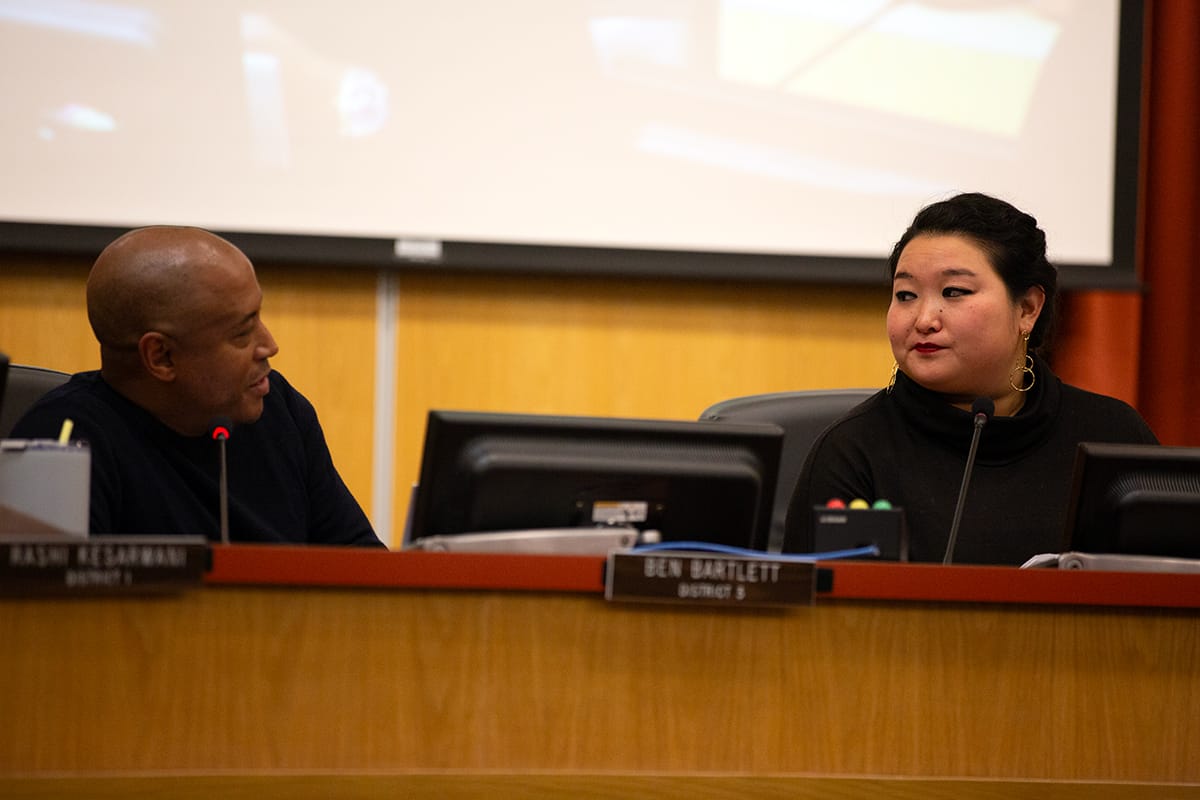
When council came back, minutes later, Ishii and Lunaparra clearly had a game plan.
" Councilmember Lunaparra, you have your mic on," the mayor said, without introduction.
Lunaparra then made a motion, " for the purposes of discussion," to move Taplin's item to a vote. Ishii seconded the motion.
This series of events was also atypical, as the person who moves an item is generally a proponent of it, and often the primary author. Neither was the case here.
At that point, Ishii immediately made her own motion, which Bartlett seconded, in support of their resolution.
Under council rules, this second motion, called a substitute motion, comes up for a vote first.
Before that happened, Taplin asked Ishii if she would consider edits to her item, known in council jargon as "friendly amendments."
It signaled that Taplin might be willing to drop his proposal and back hers if the mayor was open to compromise.
Taplin projected his suggestions, which included identifying Hamas as a terrorist organization, adding a reference to the sexual violence that took place Oct. 7, and more explicitly condemning antisemitism, onto the screen.
The edits spanned much of the mayor's item and took several minutes to explain.
In the end, Mayor Ishii declined to accept them.
"Councilmember, I think that's too many things to take in from the dais," she told Taplin. "We spent a long time working on a resolution. So, I'm sorry, but I'll have to decline your friendly amendment."
Kesarwani then broke in, asking the mayor to reconsider. She said the Taplin edits made the mayor's item "stronger and more balanced," adding: "I would respectfully request that they are all included."
"I'm sorry, I've just said that I'm not entertaining that. So I am wondering if there's…," Ishii said, seeming perplexed and trailing off before stating: "You're requesting it."
Council then moved to a vote without further discussion, as Ishii had already "called the question," bringing the motion to a vote.
Mayor: "You don't want to know what's going on"
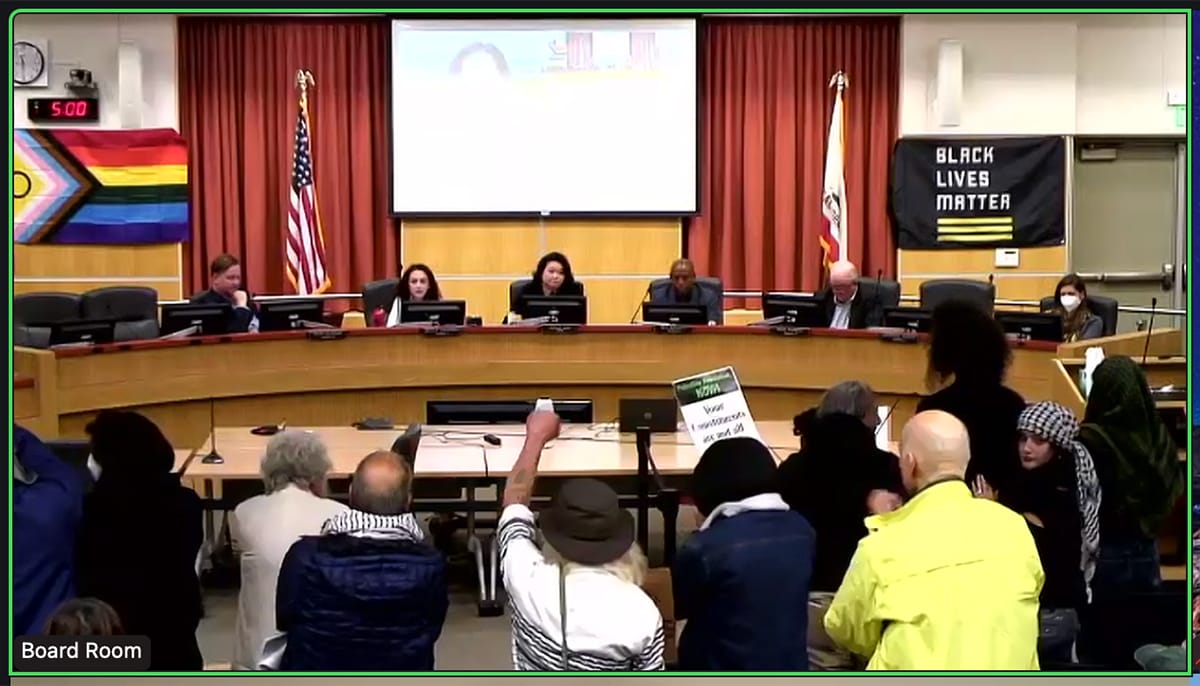
In the end, the mayor's substitute motion had four votes in favor (Ishii, Bartlett, Tregub and Lunaparra) and four abstentions (Kesarwani, Taplin, O'Keefe and Humbert) with Blackaby voting no.
The main motion, for the Taplin resolution, had seven votes in favor — Taplin, Kesarwani, Tregub, O'Keefe, Blackaby, Humbert and Ishii — with Lunaparra opposed and Bartlett abstaining.
(After first attempting to adjourn the meeting during the roll call vote for the Taplin motion, Ishii did ultimately support it.)
The votes took place as some members of the crowd got out of their seats and stood in front of the dais, waving signs and chanting loudly.
Raising her voice to compensate, Ishii tried unsuccessfully to get their attention.
" Folks, do you want to hear what was decided?" she asked, as the whistles, claps and shouts only seemed to get louder.
"There was a vote that happened already," Ishii called out. "Folks, I can't tell you what's happening. Do you wanna know what's going on?"
"No justice, no peace, no justice, no peace," was the only response.
"You don't want to know what's going on," the mayor said more quietly, almost to herself, as the clerk called the roll to end the night.
Berkeley City Council: Inside baseball
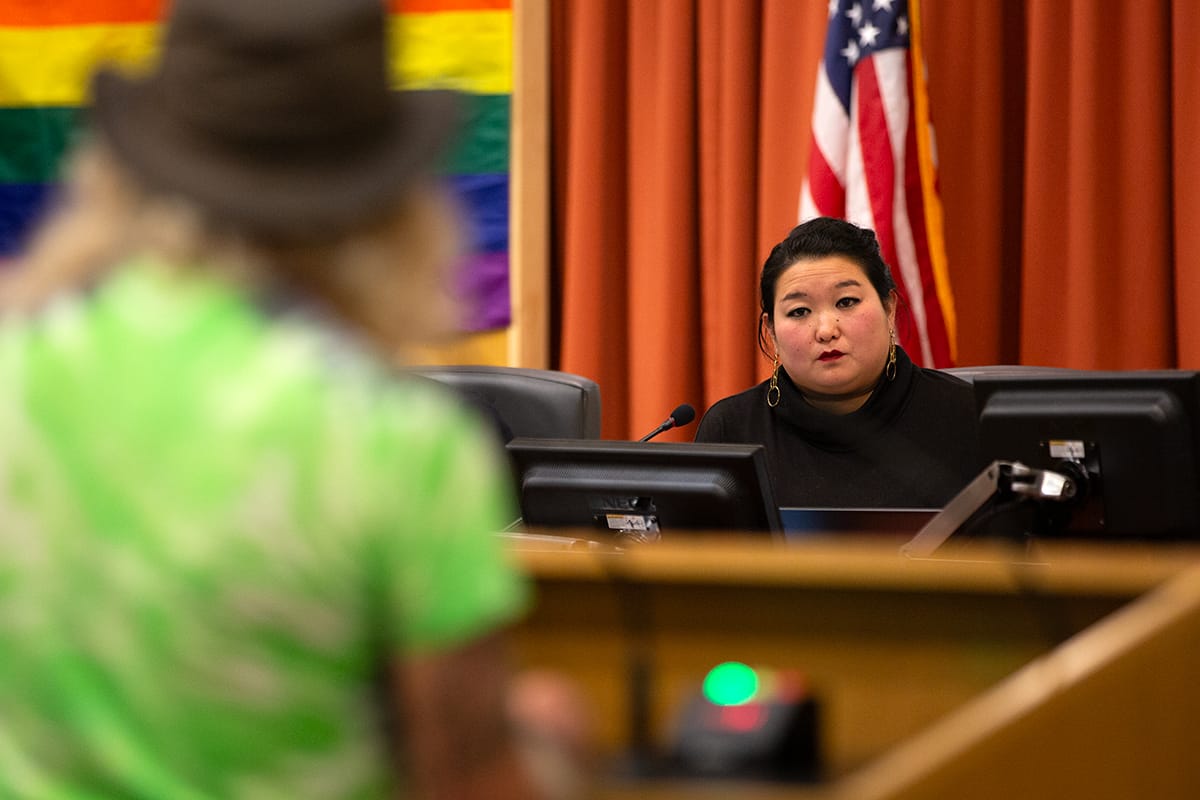
After Monday's meeting, some wondered whether the vote might signal a weakening of the ties between Ishii and the progressive base that helped elect her.
Something similar happened to Jesse Arreguín during his early days as Berkeley mayor, when many of his hard-left supporters said he betrayed them by moving toward the center.
Many others said they saw Arreguín's shift in 2016 as a sign of his political maturity — as he learned what it took to build consensus and serve the entire city.
As the downtown Berkeley rep, Arreguín had been part of the most liberal council wing, often voting with Kriss Worthington in the progressive minority.
Arreguín served as Berkeley mayor for eight years before seeking, and winning, higher office in November as the California senator for District 7.
Berkeley voters elected Adena Ishii to replace him.
She narrowly beat supposed frontrunner Sophie Hahn in a run-off contest after campaigning on a platform of healing community divides, including on the City Council.
Many have lauded her back-to-basics approach, work ethic, thoughtfulness and low-key leadership style.
Some have also highlighted her lack of experience, pointing to political defeats like Monday's as an example.
It wasn't the first time.
Earlier this year, Ishii and Taplin butted heads during a vote over council procedures, with Taplin winning majority support that night, too.
Ishii later said she had known her position might not pan out, but wanted to "fight for it on the dais" in the interest of transparency. She called it "one small blip" in what she hoped would be four years of collaboration.
That night in January, Kesarwani, Tregub, Blackaby and Humbert voted with Taplin, while O’Keefe and Lunaparra voted with Ishii. (Bartlett was absent.)
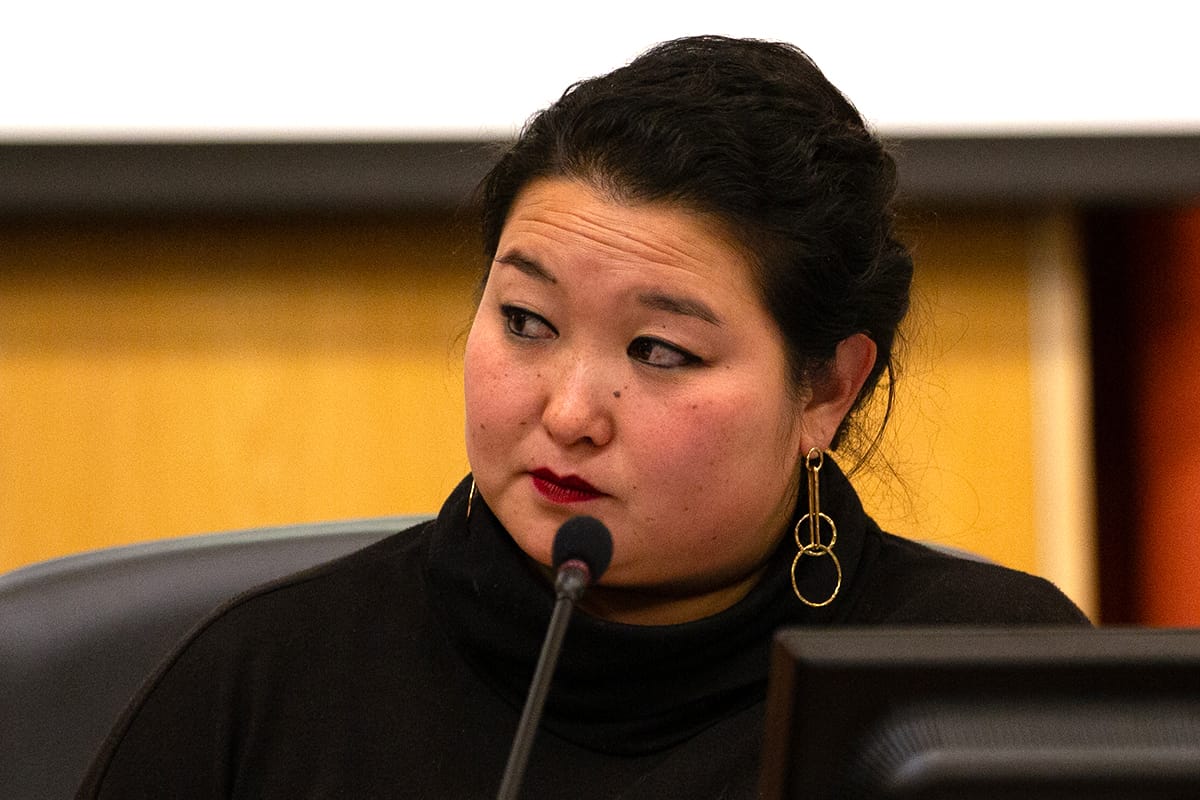
Some of those alliances appear stronger than others, particularly between Ishii and Lunaparra, with Tregub and O’Keefe looking more like swing votes.
Still, just four months into the legislative season, it remains too soon to say what council factions may take hold, particularly with so many new faces on the dais.
Both Tregub (downtown) and Lunaparra (Southside) came onto council early last year, through special elections, after their predecessors stepped down unexpectedly.
O’Keefe (North Berkeley) and Blackaby (Berkeley Hills) each won open seats and were elected in November along with Ishii.
Only Kesarwani (northwest Berkeley), Taplin (West Berkeley), Bartlett (South Berkeley) and Humbert (Claremont/Elmwood) predate last year's elections.
See the full City Council roster on the city website. Don't know your council rep? Use the Berkeley City Council district lookup tool.
More City Hall coverage from The Scanner
